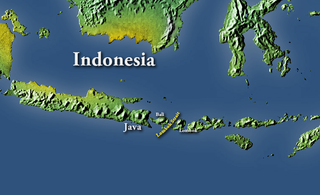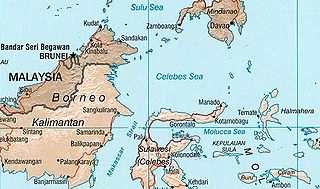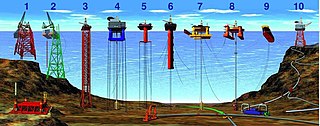Related Research Articles

Singapore maintains diplomatic relations with 188 UN member countries except Burundi, Central African Republic, Monaco and South Sudan although it does not maintain a high commission or embassy in many of those countries.

The Strait of Malacca is a narrow stretch of water, 500 mi long and from 40 to 155 mi wide, between the Malay Peninsula to the northeast and the Indonesian island of Sumatra to the southwest, connecting the Andaman Sea and the South China Sea. As the main shipping channel between the Indian and Pacific oceans, it is one of the most important shipping lanes in the world. It is named after the Malacca Sultanate that ruled over the strait between 1400 and 1511, the center of administration of which was located in the modern-day state of Malacca, Malaysia.

The Lombok Strait, is a strait connecting the Java Sea to the Indian Ocean, and is located between the islands of Bali and Lombok in Indonesia. The Gili Islands are on the Lombok side.

The Republic of Singapore Navy (RSN) is the naval service branch of the Singapore Armed Forces (SAF) responsible for defending the country against any sea-borne threats, and the protection of its sea lines of communications, that would compromise Singapore as a global trading hub. The RSN traces its origins to the Royal Navy when Singapore was still a Crown colony of the British Empire. After Singapore's independence from Malaysia in 1965, the service was formally established in 1967, and had undergone a substantial modernisation ever since—which led them into becoming the most powerful navy in Southeast Asia.

Piracy in the Strait of Malacca has long been a threat to ship owners and the mariners who ply the 900 km-long sea lane. In recent years, coordinated patrols by Indonesia, Malaysia, Thailand, and Singapore along with increased security on vessels have sparked a sharp downturn in piracy.
Maritime security is an umbrella term informed to classify issues in the maritime domain that are often related to national security, marine environment, economic development, and human security. This includes the world's oceans but also regional seas, territorial waters, rivers and ports, where seas act as a “stage for geopolitical power projection, interstate warfare or militarized disputes, as a source of specific threats such as piracy, or as a connector between states that enables various phenomena from colonialism to globalization”. The theoretical concept of maritime security has evolved from a narrow perspective of national naval power projection towards a buzzword that incorporates many interconnected sub-fields. The definition of the term maritime security varies and while no internationally agreed definition exists, the term has often been used to describe both existing, and new regional and international challenges to the maritime domain. The buzzword character enables international actors to discuss these new challenges without the need to define every potentially contested aspect of it. Maritime security is of increasing concern to the global shipping industry, where there are a wide range of security threats and challenges. Some of the practical issues clustered under the term of maritime security include crimes such as piracy, armed robbery at sea, trafficking of people and illicit goods, illegal fishing or marine pollution. War, warlike activity, maritime terrorism and interstate rivalry are also maritime security concerns.
Maritime Security Regimes are codes and conventions of behavior agreed upon by coastal states to provide a degree of security within territorial waters and on the high seas.

The Andaman and Nicobar Command (ANC) is the first and only tri-service theater command of the Indian Armed Forces, based at Port Blair in the Andaman and Nicobar Islands, a Union Territory of India. It was created in 2001 to safeguard India's strategic interests in Southeast Asia and the Strait of Malacca by increasing rapid deployment of military assets in the region. It provides logistical and administrative support to naval ships which are sent on deployment to East Asia and the Pacific Ocean.
The String of Pearls is a geopolitical hypothesis proposed by United States political researchers in 2004. The term refers to the network of Chinese military and commercial facilities and relationships along its sea lines of communication, which extend from the Chinese mainland to Port Sudan in the Horn of Africa. The sea lines run through several major maritime choke points such as the Strait of Mandeb, the Strait of Malacca, the Strait of Hormuz, and the Lombok Strait as well as other strategic maritime centres in Pakistan, Sri Lanka, Bangladesh, the Maldives, and Somalia.

The Marine Assault Team (MAST) (Malay: Unit Gempur Marin, Jawi: اونيت ڬمڤور مارين), formally known as the UNGERIN is a maritime counter terrorism and tactical unit of the Royal Malaysia Police's Marine Operations Force. Fully operational in 2007, the UNGERIN conducts anti-piracy and counter-terrorism operations in the coastal waters surrounding Malaysia and assists the marine police to respond swiftly.
Piracy in Indonesia is not only notorious, but according to a survey conducted by the International Maritime Bureau, it was also the country sporting the highest rate of pirate attacks back in 2004, where it subsequently dropped to second place of the world's worst country of pirate attacks in 2008, finishing just behind Nigeria. However, Indonesia is still deemed the country with the world's most dangerous water due to its high piracy rate. With more than half of the world's piracy crimes surrounding the South-East Asia aquatic regions, the turmoil caused by piracy has made the Strait of Malacca a distinct pirate hotspot accounting for most of the attacks in Indonesia, making the ships that sail in this region risky ever since the Europeans arrived. The term 'Piracy in Indonesia' includes both cases of Indonesian pirates hijacking other cargo and tanks, as well as the high rate of practising piracy within the country itself. The Strait of Malacca is also one of the world's busiest shipping routes as it accounts for more than twenty-five percent of the world's barter goods that come mainly from China and Japan. Approximately 50,000 vessels worth of the world's trade employ the strait annually, including oil from the Persian Gulf and manufactured goods to the Middle East and Suez Canal. The success that stems from this trade portal makes the Strait an ideal location for pirate attacks.

Piracy in the 21st century has taken place in a number of waters around the world, including the Gulf of Guinea, Strait of Malacca, Sulu and Celebes Seas, Indian Ocean, and Falcon Lake.

The Sulu and Celebes Seas, a semi- enclosed sea area and porous region that covers an area of space around 1 million square kilometres, have been subject to illegal maritime activities since the pre-colonial era and continue to pose a maritime security threat to bordering nations up to this day. While piracy has long been identified as an ubiquitous challenge, being historically interwoven with the region, recent incidents also include other types of maritime crimes such as kidnapping and the trafficking of humans, arms and drugs. Attacks mostly classify as 'armed robbery against ships' according to the United Nations Convention on the Law of the Sea as they occur in maritime zones that lie under the sovereignty of a coastal state. Incidents in the Sulu and Celebes Seas specifically involve the abduction of crew members. Since March 2016, the Information Sharing Centre (ISC) of the Regional Cooperation Agreement on Combating Piracy and Armed Robbery against Ships in Asia (ReCAAP) reports a total of 86 abuctions, leading to the issue of a warning for ships transpassing the area.
The Centre for the Study of Terrorism and Political Violence (CSTPV), also known as the Handa Centre for the Study of Terrorism and Political Violence, is a research centre at the School of International Relations at the University of St. Andrews, and is Europe's oldest terrorism research facility. The CSTPV is "dedicated to the study of the causes, dynamics, characteristics and consequences of terrorism and related forms of political violence", while committed to rigorous, independent evidence-based scholarly analysis. In addition, the CSTPV investigates the responses of states, civil society, and international organizations to violent modes of waging conflict. As the basis of its work, the CSTPV maintains databases, manifestations, and consequences of terrorism and other forms of political violence.

Clive Owen Gestern Williams, is a British-born former Australian Army Military Intelligence officer, and academic with research interests in terrorism and counterterrorism, politically motivated violence, insurgency and counterinsurgency.
The National Special Operations Force (NSOF) was Malaysia's main security force which serves as the first responder to any terror threats on the country's sovereignty. The force covers elements from the Malaysian Armed Forces, Royal Malaysia Police and the Malaysian Maritime Enforcement Agency.

Offshore installation security is the protection of maritime installations from intentional harm. As part of general maritime security, offshore installation security is defined as the installation's ability to combat unauthorized acts designed to cause intentional harm to the installation. The security of offshore installations is vital as not only may a threat result in personal, economic, and financial losses, but it also concerns the strategic aspects of the petroleum market and geopolitics.
International piracy law is international law that is meant to protect against piracy. Throughout history and legal precedents, pirates have been defined as hostis humani generis, Latin for "the enemy of all mankind". The United Nations has codified much of the law in the United Nations Convention on the Law of the Sea (UNCLOS), which defines different types of piracy and ways to combat it.
Maritime terrorism in Southeast Asia refers to acts of extreme maritime violence committed with political motives within the Southeast Asian region. Despite seaborne terrorist attacks accounting for only 2% of all international terrorist incidents from 1978 to 2008, according to RAND's Terrorism Database, Southeast Asia has proven a hotbed of maritime terrorism. Due to the high frequency of pirates in the region, many Southeast Asian-based terrorist groups have appropriated piratical tactics in carrying out their violent political struggles. In 2003, the International Maritime Bureau reported that out of the 445 actual or attempted piratical attacks on merchant vessels, 189 occurred in Southeast Asia, which was more cases than either Africa or Latin America, with 121 attacks occurring in Indonesian waters and 35 attacks occurring in Malaysian and Singaporean waters. In 2004, while the number of actual and attempted attacks fell to 325, Southeast Asia remained at the top of the regional rankings, with 93 incidents occurring in Indonesian waters. Between 2014 and 2018, 242 attacks occurred in Southeast Asia, with the majority occurring in Indonesian waters. The most popular weapons of choice among Southeast Asian maritime terrorists have been explosive devices and firearms, which were used in roughly 60% of maritime attacks in the region.
Private maritime security companies (PMSCs) are private security companies with a focus on providing maritime security. PMSCs are sometimes referred to as Private Security Companies (PSCs) or Private Military Security Companies (PMSCs), which are private land-based security companies that also offer maritime services.
References
- ↑ ISCR (2010). "Al Muhajiroun and Islam4UK: The group behind the ban"
- ↑ IMSS (2006). "International Maritime Security Symposium speaker biographies Archived 16 June 2007 at archive.today "
- ↑ RSIS (2006). "Safety and Security in the Malacca and Singapore Straits Archived 18 December 2008 at the Wayback Machine "
- ↑ Jamestown Foundation Terrorism Monitor (2006). "The Threat of Maritime Terrorism in the Malacca Straits"
- ↑ Taylor and Francis (2008). "Lloyd's MIU Handbook of Maritime Security"
- ↑ Piracy and Maritime Crime: Africa, Asia, and Southeast Asia, edited by Bruce Elleman and S.C.M. Paine (US Naval War College, 2009), p. 31-42.
- ↑ "Security in the Maritime Domain and Its Evolution Since 9/11" in Lloyd's MIU Handbook of Maritime Security, S. Bateman, R. Herbert-Burns and P. Lehr (Eds.), Taylor and Francis, 2008., p. 3-11.
- ↑ HKS (2005). "Peril in the Straits of Malacca Archived 29 June 2011 at the Wayback Machine "
- ↑ Harvard University Press (2005). "Piracy in Southeast Asia: New Trends, Issues and Responses Archived 27 December 2008 at the Wayback Machine "